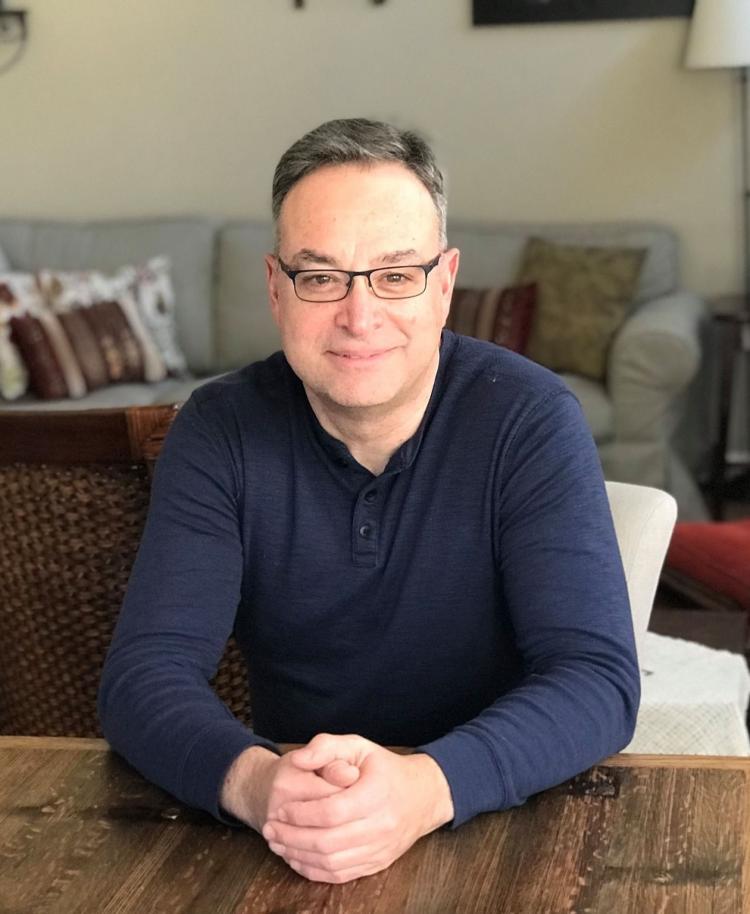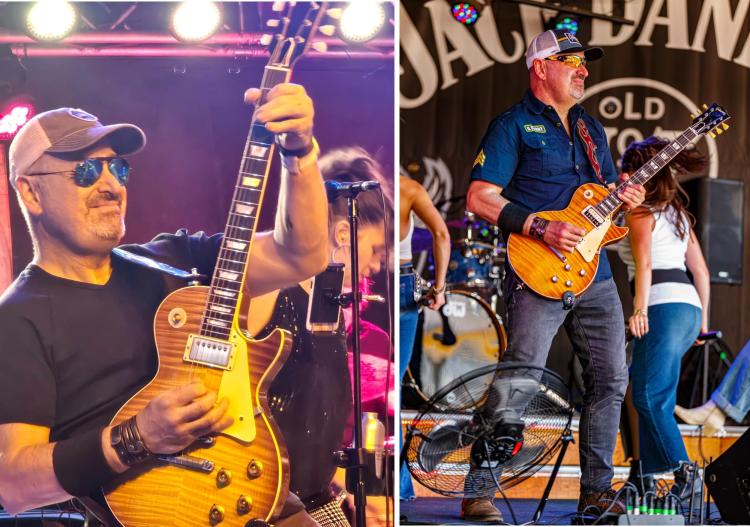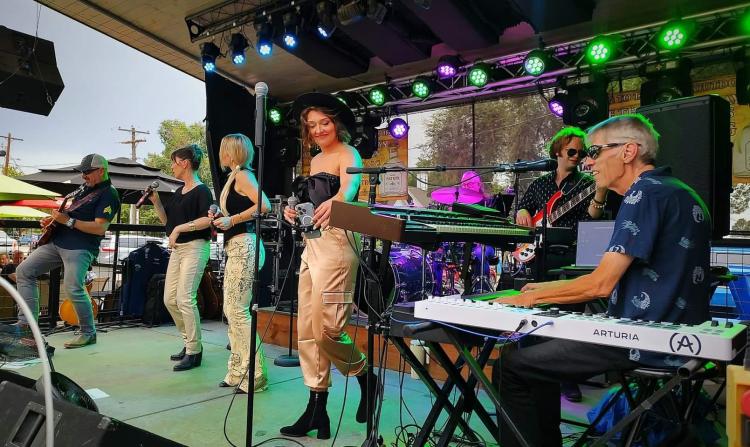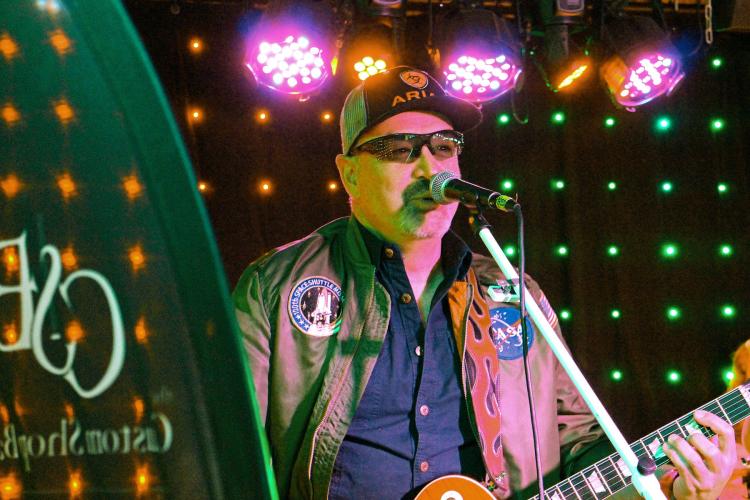He will, he will rock you
Pursuing a passion for music, CU Boulder economist Murat Iyigun transforms from recognized expert on economics of the family and economic history to regional rock star with a growing musical reputation
In a low-key pub and grill on a quiet street in Littleton, Colorado, it’s about 10 minutes to 8 on a Saturday night, and the renowned economist seems to be in six places at once.
He’s sound checking his guitar and finalizing plans with the light technician and joking with the singers and ticking through the set list with the drummer and donning a dusky green bomber jacket and wraparound shades.
The dance floor in front of the stage is empty for now, but it won’t be for long. At a little after 8, members of the steadily growing audience put down their forks and drinks to welcome—as they’d been invited, as the musicians had been introduced—the Custom Shop Band.

Murat Iyigun is a professor of economics focusing on the economics of the family and economic history.
A kaleidoscope of colored lights flashes from the rafters toward the stage as lead singers Amy Gray, Mckenna Lee and Abbey Kochevar begin an iconic refrain: stomp-stomp-clap, stomp-stomp-clap.
“Buddy you're a boy, make a big noise, playin' in the street, gonna be a big man someday,” Gray sings, achieving the stratospheric, Mercurian growl and grandeur of the original. “You got mud on your face, you big disgrace, kickin' your can all over the place. Singin'…”
The renowned economist leans toward his mic and joins the immortal chorus: “We will, we will rock you.”
It wasn’t so much a threat as a promise. For the next four hours, minus breaks between sets, the band founded by Murat Iyigun, a University of Colorado Boulder professor of economics and former economist with the Federal Reserve Board in Washington, D.C., would rock everyone there.
And they would rock hard.
‘You should listen to Queen’
The question, then, is how does a scholar and economist widely known for his research on the economics of the family and economic history come to be on a pub-and-grill stage on a Saturday night, slaying licks originally conceived by Brian May?
“Life is funny, isn’t it?” Iyigun admits.
The story starts, as not many rock stories do, in Ankara, Turkey. The son of a Turkish father and a Turkish-American mother, Iyigun grew up during a tumultuous time in Turkey, when older kids might stop him on the street to ask whether he was a leftist or a rightist. Still, he says, he was lucky and maybe even a little sheltered, while some of his older sisters’ friends became victims of the left/right violence.
It was that violence, in fact, that caused his older sister’s university to be shut down for seven months. To continue her chemistry studies, she transferred to The Ohio State University, but not before leaving her LP collection to her younger brother.
“I was about 13, and I was counting the days to when she left in July because I was going to be getting all the LPs,” Iyigun recalls with a laugh. “‘Hotel California’ was huge that summer, and then there was Cat Stevens, ELO. I was totally captivated even though, compared to now, things were so closed for us. Going to the U.S. was like going to Mars. But in terms of music and Western culture, especially among urban secular Turks, we followed everything.

Murat Iyigun was inspired to learn to play the guitar after hearing Queen's album Live Killers. (Photos: The Custom Shop Band)
“Now you can get all the vinyls and they’re easy to come by, but at that time people basically made tapes that everyone shared around. There was all this bootleg stuff that would come from Europe, and someone in Istanbul would press some vinyls, but I was never sure if they had an agreement (with the record labels) or if those were counterfeit.”
At the tender age of 13, Iyigun was more into the mellow side of rock n’ roll. A few years deeper into his teens, however, and he discovered KISS. Visiting family in the United States during the summer of ’78—a time that might be considered the fever-pitch apex of the band’s makeup years—Iyigun acquired all things KISS: T-shirts, posters, tapes, you name it.
It might have been the following summer, he doesn’t remember exactly, that he went camping with friends and met one of the great platonic loves of his teenage years—an older girl who inadvertently changed his life.
“She said, ‘You should listen to Queen, they’re a great band,’” Iyigun recalls. “So, I asked someone to make me a tape of the Live Killers album, and that was it.”
It says something about what happened to him, listening to that album, that he currently has—in a glass case in his Boulder home—a replica of May’s immortal Red Special guitar, signed by May. Iyigun also bought Red Special replicas for both of his daughters.
He heard Live Killers and had to learn to play guitar, is the point. Then he and some of his friends, including an ambassador’s son whose presence allowed them to practice at the Swiss embassy in Ankara, formed a band. Iyigun absolutely loved it, but making it as a rock musician in a Muslim country in the 1980s started to strike him as increasingly impossible.
“I thought, ‘OK, I need to get my act together,’” Iyigun says, so he came to the United States to earn an MBA at Boston University and then a master’s and PhD in economics at Brown University.
His parents had given him a Les Paul guitar when he graduated high school and began studying business administration at Hacettepe University—“in Turkey back then you just didn’t have these instruments, so for my parents I know this was very costly,” he explains—and as a graduate student at Brown he bought an amp and noodled around at home.

The Custom Shop Band includes, left to right, lead guitarist Murat Iyigun; singers Amy Gray, Mckenna Lee and Abbey Kochevar; drummer Kevin Thomas; bassist Elliot Elder; and keyboardist Tone Show. Steve Johnson (not pictured) also is a member of the band. (Photo: The Custom Shop Band)
But then life happened. He was beginning his career, he had a wife and young children, he was working toward tenure, and he just didn’t have time to play, for more than a decade.
Then, about 15 or so years ago, at a time he was hardly ever playing guitar, his daughters and wife gave him the game Guitar Hero for Father’s Day. He played it a bit and realized the game console was an instrument in its own way, so with typical focus “I thought, ‘I need to learn to play it well,’” he says. “It’s nothing like guitar playing, but I thought I could learn to do this, and then I was thinking about how I used to play. And that’s when I brought out my guitar.”
Learning through blues jams
“Once I started to come back to it, I realized some of my fundamentals had gone,” Iyigun says. “So, I started by taking these baby steps. I immediately hooked up with a great music teacher, Jeff Sollohub, a Berklee (College of Music) graduate and super nice guy, and every two weeks I’d work with him on a new song, on composition and things like that.
“Within a year or two, I realized I’m only going to get so good if I don’t actually go out and play. By the time I came back to it, there were so many more resources online, YouTube and things like that, and I still got a lot of joy out of playing at home. But I quickly realized there’s a limit to how much I can improve unless I get out and play. That’s when I discovered blues jams, which are the easiest way to go play live even though blues is super difficult to play well.”
He went to multiple blues jams a month around metro Denver and endured the “painful, painful learning process.” A significant moment of clarity and focus came when he saw the parallels between being onstage playing and lecturing in front of a full classroom or at an economics conference.
“I had a lot of embarrassing days where the ride home would be miserable, and I did that for a couple of years, and I was discovering other jams and just kept playing,” he says. “The limitation of blues jams, though, is you pack all the gear, get in the car, drive 40 minutes, get on the list, then the person running the jam will put these bands together and you play for 20 minutes. So, I drove there an hour, waited an hour, spent this time to play 20 minutes—and 18 minutes of that was painful.
“But after doing that a couple years, this blues band of three guys needed a guitar player, and they’d seen me play, so they said, ‘Do you want to join a band?’ I joined for about a year, and there was this point where I’m like, ‘Yeah, this is what I want.’”
Inside, though, he was still the kid obsessed with KISS and Queen who knew all the guitar greats, not just the blues ones. He was treasurer for Mile High Blues Society, but he wanted to play rock.
Joining the band
The Custom Shop Band—the name is a reference to the custom guitars Iyigun plays—came together in a way that could be interpreted as either patchwork or destiny: friends of friends, acquaintances who know a guy, calls and emails that began with, “Hey, are you interested in being in a band?”
Elliot Elder, the Custom Shop Band bass player and a 2022 CU Boulder graduate in jazz bass performance, was recommended by a mutual friend. Amy Gray, the original in what is now a trio of lead singers, was recommended to Iyigun by another mutual friend:
“I was singing with another band and had recently left them when I got a message from Murat,” Gray says. “He saw me in a video from that band, and he said they were looking for someone to do backups and fill in when their lead at the time was not available.
“So, I looked them up, I went to a show to see what they sounded like and saw that they played some fun songs, that they as instrumentalists all sounded good, so I thought, ‘Why not, let’s give it a chance, they all seem very nice’ and I jumped in and went with it.”

Murat Iyigun joins in on harmony during the Custom Shop Band's set list of "hits, with a twist."
Gray recruited Kochevar, whom she knew from performing with her in theater, and Lee, who had recently moved to Colorado from California and whom she knew through mutual friends. And that’s how the Custom Shop Band has worked: Iyigun founded it and continues to act as band leader and manager, but in every other way it’s a democracy.
“Murat is an awesome band leader,” Elder says. “One of the reasons why a lot of bands don’t get past a certain point, in my opinion, is the band leader doesn’t have the flexibility and communication skills to manage situations where lineups change, things change on short notice, people have different ideas about how a song should be played. Murat’s emailing venues, scheduling gigs, managing lineups and all the while teaching at CU. He puts a lot of work into it. You meet a lot of people in the music scene who don’t communicate, who don’t get details to people on time, but Murat is definitely an exception.”
The band, which also includes Kevin Thomas on drums and either Tone Show or Steve Johnson on guitar and keyboards, practices in-person when adding a new song to the set list or a new musician, but otherwise its members practice at home with versions of the songs that Iyigun sends to everyone. In keeping with the band’s democratic ethos, every member brings song suggestions to the table.
At any given show, the Custom Shop Band may open with Queen’s “We Will Rock You,” and soon thereafter play “Flowers” by Miley Cyrus and “It’s Raining Men” by The Weather Girls, which might be followed by a mashup of Foreigner’s “Jukebox Hero” and Led Zeppelin’s “Whole Lotta Love.”
On a Saturday night in September, at a pub and grill on a quiet street in Littleton, “So What” by P!nk gets booties to the dance floor in a joyful melee. A dude to the left is lost in his own world of intricate air guitar and a lady on the right has divested herself of shoes. A little later, as the band plays Cheap Trick’s “I Want You to Want Me,” the air guitarist to the left reaches a fever pitch as the band’s lead guitarist, who also happens to be a renowned economist, absolutely wails on the solo.
And transitioning smoothly into Sweet’s “Ballroom Blitz,” the dancefloor still throbbing, the economist is grinning wide.
He will rock you.
Did you enjoy this article? Subscribe to our newsletter. Passionate about economics? Show your support.

